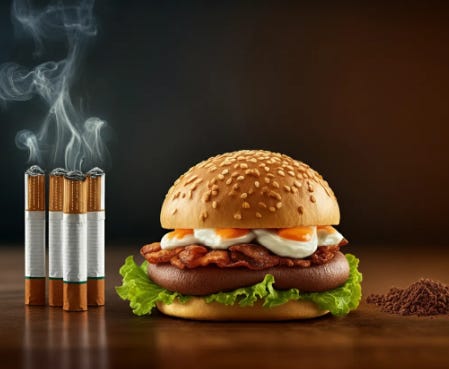Remember when big tobacco played dirty and millions died? Now the same industry has infiltrated the American food sector. It makes sense; since both are in the addiction business.
The story begins with a corporate acquisition that forever altered the landscape of the American diet. Philip Morris, a giant in the tobacco industry, acquired General Foods in 1985 and Kraft Foods in 1988, gaining control over popular snacks, beverages, and processed foods. This move wasn’t just about diversifying investments; it was a strategic play to harness the addictive potential of food, much like tobacco, to ensure enormous profit growth.
The combined revenues from their food and tobacco operations turned Philip Morris into one of the largest corporations in the world, generating billions of dollars annually from their products, both cigarettes and processed foods.
Those companies have since split their tobacco businesses from their food businesses, but heavy-handed product marketing may forever be ingrained in the companies’ DNA. The term "junk food" is colloquially used to describe their products, and it’s not a coincidence; it's a calculated design to maximize consumption and, consequently, profits.
Their tactics have been enormously successful. An epidemic of "diabesity," a portmanteau of diabetes and obesity posing both a health and economic threat, is staring us in the face. Globally, the financial burden of obesity and diabetes is staggering, with an annual $2.6 trillion cost.
From Cigarettes to Snacks
Research sheds light on how Big Tobacco's methodologies were adapted for the food industry. The industry’s extensive research into addiction, initially conducted to understand the addictive nature of cigarettes, was later repurposed and applied to the food industry, leading to the creation of highly addictive food products that mimic the same addictive mechanisms as nicotine. (The Milbank Quarterly).
They engineered processed foods to be "hyperpalatable," designed to encourage overconsumption by intensely stimulating the brain's reward centers. Today, an estimated 68% of the American food supply is hyperpalatable. Foods developed by tobacco-owned corporations are 29% more likely to be fat-and-sodium hyperpalatable, and 80% more likely to be carbohydrate-and-sodium hyperpalatable, than foods not tobacco-owned.
Helping the insidious cause are regulatory agencies meant to shield consumers from harmful industries. They seem either overmatched and overpowered against such colossal conglomerates or have financial ties to them. The Food and Drug Administration is supposed to regulate food and drugs to ensure public safety, but in reality, its actions are heavily influenced by powerful lobbying from the food industry. This has led to lenient regulations on unhealthy ingredients and inadequate labeling standards that keep consumers in the dark about what they eat.
These same lobbying efforts have also stymied efforts to limit junk food advertising, particularly to children. The food industry has no conscience, having consistently fought against measures that might hurt their bottom line.
A Call to Action
There is an insidious underbelly of capitalism—one that craftily obscures the horror of processed foods. Packaging dazzles, slogans sing, and ingredients confound – it all feels like a cunning ruse designed to distract us from the devastating truth lurking behind labels.
That’s why public health must begin with corporate changes; such as transparency in food labeling and marketing. Campaigns, similar to those that successfully reduced smoking rates, could help shift consumer behavior towards natural, whole foods that prevent disease.
Policy changes could also regulate the processed food industry more stringently. This would include measures such as taxing sugary drinks, restricting junk food advertising, especially to children, and incentivizing the production and consumption of whole, unprocessed foods.
As the world grapples with the consequences of an obesity epidemic, the lessons learned from combatting Big Tobacco could serve as a valuable blueprint. By recognizing the parallels and taking decisive action, society could be free from the grips of industries that prioritize profit over public health.
Your presence here is greatly valued. If you've found the content interesting and useful, please consider supporting it through a very cost-effective paid subscription. While all our resources are freely available, your subscription plays a vital role. It helps cover some operational costs and supports the continuation of this independent, unbiased research and journalism work. Please make full use of our free library.
If shy about commitments, feel free to leave a one-time tip!







